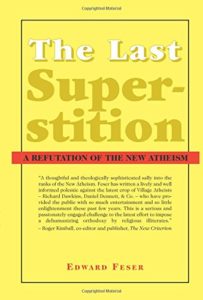

He is also the author of many academic articles. in philosophy and religious studies from the California State University at Fullerton.Ĭalled by National Review “one of the best contemporary writers on philosophy,” Feser is the author of On Nozick, Philosophy of Mind, Locke, The Last Superstition: A Refutation of the New Atheism, and Aquinas, and editor of The Cambridge Companion to Hayek and Aristotle on Method and Metaphysics. in religion from the Claremont Graduate School, and a B.A. in philosophy from the University of California at Santa Barbara, an M.A. He has been a Visiting Assistant Professor at Loyola Marymount University in Los Angeles and a Visiting Scholar at the Social Philosophy and Policy Center at Bowling Green State University in Bowling Green, Ohio. Like the "don't walk under a ladder" superstition, this seems to be a case of a myth arising to keep people from doing something that is slightly dangerous in the first place.Edward Feser is Associate Professor of Philosophy at Pasadena City College in Pasadena, California. Legends abound, from a story of an ancient Roman woman who happened to have opened her umbrella moments before her house collapsed, to the tale of a British prince who accepted two umbrellas from a visiting king and died within months.

Opening an umbrella indoors is supposed to bring bad luck, though the origins of this belief are murky.

… And not just because you'll poke someone's eye out. (Anything associated with the shape of the Christian cross was thought to be good luck.) The tradition gradually became something people could do on their own these days, just saying "fingers crossed" is enough to get the message, well, across. The story goes that two people used to cross index fingers when making a wish, a symbol of support from a friend to the person making the wish. Those wishing for luck will often cross one finger over another, a gesture that's said to date back to early Christianity.


 0 kommentar(er)
0 kommentar(er)
